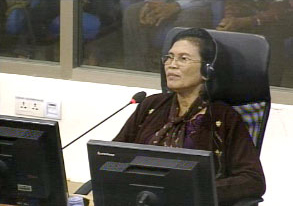Khieu Samphan was an honest family man who helped in the kitchen, washed diapers, rocked his children asleep and lived a simple, ascetic life devoid of any of the excesses government leaders are usually accustomed to.
So said his devoted wife, 62-year-old So Socheat, who took the stand at the Khmer Rouge tribunal on Monday as one of several character witnesses called by the defense in Case 002.

Ms. Socheat joined the resistance movement, which was being fomented in Cambodia’s jungles, in 1971. She found work as a cook and it was while delivering a meal one day that she first saw Pol Pot, Nuon Chea and Khieu Samphan sitting together at a table.
About three or four months later, she was told Khieu Samphan would like to marry her, but she chose to wait and see if he would be a good match.
“Sometimes he offered to help me with the kitchen work and I also asked him to help sort the beans. I had to study him. I learned he was an intellectual. He came to help me peel garlic. I could verify his personality. I understood him to be the right man, so then we tied the knot,” she said.
So began a trying time in the jungle, which required moving around and sleeping in hammocks.
By the time Phnom Penh fell to the Khmer Rouge in 1975, the family had moved to the K-1 and then K-3 offices, where the regime’s leaders lived and worked.
“I would stay in his room,” Ms. Socheat said. “There was nothing in that room. No bed, no mattress. Not even a pillow. We slept on a mat on the floor. We had clothes that we used as a pillow.”
Their eldest son was taken away to the regime’s children’s unit when he was just 3, she said—a move neither she nor her husband supported, but had no way of preventing.
As for their baby daughter, “Khieu Samphan would carry her until she fell asleep,” Ms. Socheat said.
“Life was very difficult. Life was not better in Phnom Penh than what we experienced in the jungle.”
During questioning, Ms. Socheat was asked by Khieu Samphan’s defense lawyer Arthur Vercken to tell the court why she was supporting her husband, who “is accused of extremely serious crimes.”
“He is kind, gentle, he is non-discriminatory, he does not discriminate between poor and rich,” she said in response. “My husband is an honest person and I trust him.
“If my husband is to be compared to other men, he is the best—a man of virtue, high morality—never upset me by any act. He is very faithful. He has no privileges in anything. We didn’t have anything excessive in the house even though other leaders had good cars, nice houses—my husband never enjoyed that kind of life.”
“He’s not cruel, he’s not a murderer, he didn’t go around making any arrests. I put my life on that before you.”